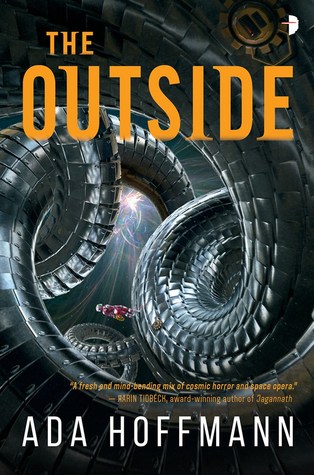
Genres: Queer Protagonists, Sci Fi
Representation: Sapphic autistic MC, F/F or wlw, genderfluid PoV character
ISBN: 0857668137
Goodreads

Humanity's super-intelligent AI Gods brutally punish breaches in reality, as one young scientist discovers, in this intense and brilliant space opera.
Autistic scientist Yasira Shien has developed a radical new energy drive that could change the future of humanity. But when she activates it, reality warps, destroying the space station and everyone aboard. The AI Gods who rule the galaxy declare her work heretical, and Yasira is abducted by their agents. Instead of simply executing her, they offer mercy - if she'll help them hunt down a bigger target: her own mysterious, vanished mentor. With her homeworld's fate in the balance, Yasira must choose who to trust: the gods and their ruthless post-human angels, or the rebel scientist whose unorthodox mathematics could turn her world inside out.
Highlights
~And you thought Terminator had scary AIs
~Prayers through the internet
~never trust an angel
~there’s a protocol for monsters under the bed
~#EluDeservesBetter
I’ve been trying to write a review for The Outside since I first read it two years ago. It’s a tough one for me to talk about, both because I have no idea where to start when it comes to describing all the awesomeness that is this book – and there is a lot of it – and because it was the first time I saw a canonically-autistic main character since I was diagnosed myself. So discovering this book, reading it, loving it – the whole process was much more personal for me than connecting with a book usually is. Besides being a really, really great story, it gave me a lot of food for thought.
The blurb for this one leaves quite a lot out: Yasira is indeed autistic, is indeed a scientist – but she didn’t come up with the Shien reactor on her own. She only co-authored the paper that led to the reactor’s construction – her co-author being Dr Talirr, who was also her mentor during Yasira’s doctoral studies. When a bunch of people decided they wanted to actually build a reactor based on the physics in that paper, they wanted Talirr. But Talirr had vanished without explanation by then, so they accepted Yasira.
This is all important.
The reactor itself is hugely important for all of humanity, because in the future Hoffman has created, human technology is what we would consider embarrassingly limited. This is because the Gods – incredibly huge, complex, and powerful AIs who run human civilisation – don’t trust humanity with more than basic calculators and boxy television sets. Which is kind of fair, because humans destroyed Old Earth with their technology, and only the rise of the Gods saved them from also destroying themselves.
If the reactor works, it will enable humans to build and power the first not-God-built space station. It’s a big deal.
And then it goes wrong. It goes wrong, because Talirr was using – and teaching Yasira – math that isn’t really math. Science that isn’t really science. The best word is probably ‘magic’, but that’s not right either. Call it a system that utilises principles of quantum physics…but with monsters.
Kind of.
Here is a workingman’s understanding of quantum physics: it says that below everything, atoms and molecules and everything else, everything is just energy. There is no difference between you and me or the keyboard I’m typing this with or the screen you’re reading it on. All of it is energy. When you break everything down, it’s all just – energy.
Talirr says that time is a lie. Space is a lie. Life is a lie. And the thing that is so mind-breaking about this book – about Talirr’s practices – is that she’s not wrong. On a quantum level, time and space and life don’t really exist. Except that they simultaneously do, right, because we experience them. On our level, time and space and life absolutely exist.
Talirr isn’t very interested in our level. She is much more interested in the Bigger Picture. Zoom out far enough, and none of us exist. And on that level of reality, There Be Monsters.
When the reactor destroys the space station, Yasira is taken away by angels of the goddess Nemesis – the goddess who hunts down evildoers and heretics, and don’t let her hear you questioning whether those are the same thing – because they believe that she might be able to help them. She understands Talirr’s ‘science’ well enough to build the reactor. Does she understand it enough to stop her mentor – who is doing her best to break reality?
The worldbuilding is so unbelievably fascinating. The Gods in particular, the whole concept of them, I just adore. I suspect the idea of worshipping AIs has been done before, but Hoffman has co-opted religious language and ceremony in wickedly clever ways; the angels, for example, are cyborgs, human flesh + God-crafted technology – but they’re still called angels. There are still religious services and prayers – it’s even a fundamental fact that human souls exist, because somehow, when you die your soul is sorted and taken by the appropriate God (they all have different preferences; this one takes artists, that one takes engineers, etc). Without souls, the Gods would cease to be Gods, would become some kind of less powerful and complex AI. It’s not at all clear how dead souls get to the gods – at first I thought it was a kind of brain-scan, a reconstruction of a deceased person’s personality, but no, it’s something much more ephemeral than that. I hope sooner or later it becomes clearer how that all works, but regardless, it’s a very unique, fascinating touch. Yasira – and through her, the reader – encounter unbelievably advanced technology as she works with the angels (because the Gods keep all the good toys for themselves), but bringing souls into it is…a different sort of sci-fi. Maybe bucking sci fi conventions completely. That one, relatively small detail – the existence of souls – is enough all by itself to make the world of The Outside something very, very different from anything you might expect.
But even without that detail, the universe Yasira lives in is incredible. Far from perfect – this isn’t any kind of utopia, although I wouldn’t describe it as a dystopia either; most civilians are perfectly content living normal, happy-enough lives. But…humans live across multiple planets in this future. There are spaceships and portals and cyborg-angels. There’s the relationship between the Gods and humans. And humans still aren’t a monolith; different countries, never mind different planets, have different opinions on nuerodivergence, structure their families in different ways, etc. It’s all incredibly new and interesting, but it also feels absolutely real.
Also realistic is the complete lack of easy answers. Nemesis and her angels are very far from benevolent, and Yasira has a pretty hard time figuring out whether helping them is actually the right thing to do. Talirr is going around breaking bigger and bigger pieces of reality – causing incredible suffering to the people affected – but Nemesis’ approach is to burn and salt the earth of the infected affected areas. Including all survivors.
So whose side is Yasira supposed to be on?
Yasira is a character who finally makes complete sense to me. It’s not at all that all autistic people are alike, but I’ve got to admit, I struggle to understand the motivations and actions of nuerotypicals sometimes. I never had that problem with Yasira. I don’t know how nuerotypical readers will find her, but the way her mind worked just made sense. And that’s such a huge relief, to find people – even fictional people! – who reason the same way I do. I didn’t always agree with Yasira, but I always got her, and that means more than I can say.
On a bigger-picture level, I feel like Hoffman’s presentation of autism combats some pretty big, dangerous stereotypes. Dr Talirr is also autistic, and in perceiving Outside – the reality of reality, the fact that time/space/life is a lie, everything is only energy – her takeaway is that, since other people are just energy, killing them doesn’t matter. And a big horrible stereotype about autism is that autistic people don’t – or worse, are unable to – care about others; their feelings, their existence, their lives. But countering Talirr’s assertions that life is a lie, we have Yasira. Yasira who is also autistic, who can also make some kind of sense of Outside – and yet does not at all think that ‘we are all just energy’ means it’s fine to kill people. Talirr’s perspective, it is clear, comes more from her trauma at the hands of the Gods – who tried their best to beat her perception of Outside out of her when she was a child – than anything else. It’s not because she’s autistic. Hells, even without talking about Outside at all, when the book starts, we see Yasira in a happy relationship with her girlfriend Tiv – whom she thinks about a great deal, and cares about infinitely, throughout the book, even though they spend most of the story separated. Autism doesn’t mean you’re incapable of caring. Fucking trauma, on the other hand, flat-out abuse, can definitely twist a person up. That’s what Talirr suffered, and that’s why she is the way she is.
It just. Means a lot to me, that Hoffman underscores that point very, very hard: autism doesn’t make you immoral. It doesn’t mean you can’t love people. It doesn’t mean you can’t care about abstract strangers you’ve never met. It doesn’t, gods forbid, mean you think killing people is a non-issue!
This isn’t the epic, beautiful review I wanted to write. I’ve been trying to get my feelings about this book down for two years, and I think I have to accept I’m never going to manage it, not in as pretty a package as I’d like. But this is a brilliantly original sci-fi, with a viciously compelling story, great autistic rep, and a cast so interesting it’s hard to hate the characters you’re meant to hate.
I adore it, and I hope you’ll give it a try, because I think you will too.






Leave a Reply